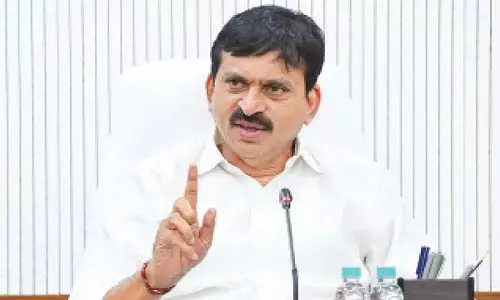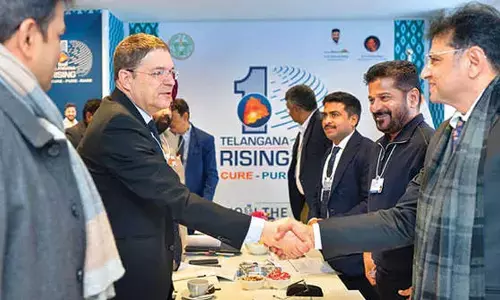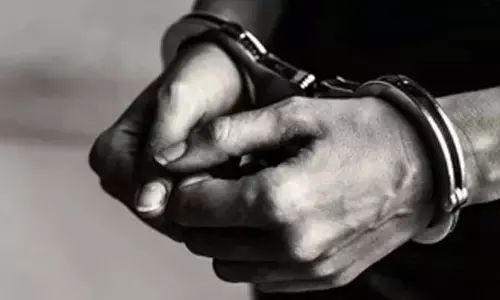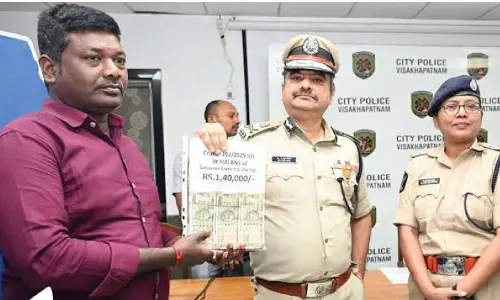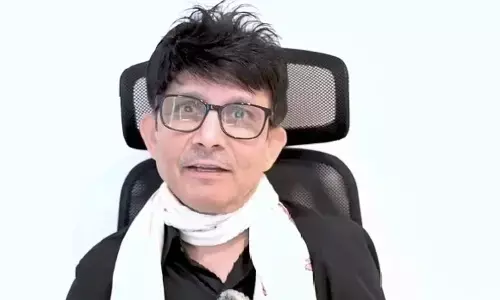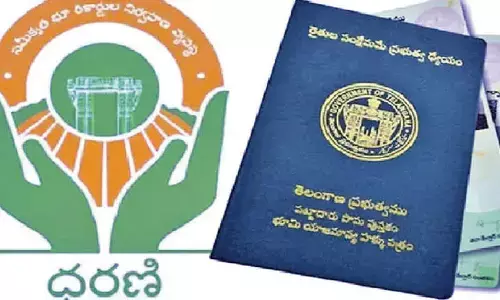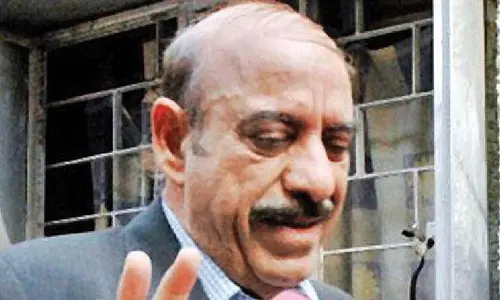The challenges of parliamentary democracy

Nation is in the midst of the biggest democratic knees-up and there are four more phases of balloting to go before the public knows who will form the government at the Centre and some States in the country.
Nation is in the midst of the biggest democratic knees-up and there are four more phases of balloting to go before the public knows who will form the government at the Centre and some States in the country.
As the seven-phased 17th general elections to the Lok Sabha are underway in the world's largest democracy, the efficacy of the parliamentary system of government has once again become a topic of interest.
Generally, a parliamentary form of government works properly under a two-party system like in Britain and provides the much-needed political stability to the country.
But it has its own practical difficulties while functioning in a country like India, with its multi-cultural, multi-racial, multi-lingual, multi-religious, pluralistic political landscape.
In this country, electoral outcomes are a big gamble.Formation of governments has become an uphill task, in case of hung Parliaments.
One of the perils of parliamentary system is that it could be converted into a Prime Ministerial government or a Cabinet dictatorship with the Prime Minister developing authoritarian tendencies, if the ruling party wins by a landslide majority.
It happened in the year 1975 when the then Prime Minister Indira Gandhi, after she was unseated by the Allahabad High Court judgment on the grounds of electoral malpractices, declared Emergency in the country suspending all the Fundamental Rights and continued till March, 1977 till the Janata Party formed the government after it was swept into power.
For nineteen months, democracy went missing from parliamentarism, in a way, proving the German jurist Carl Schmitt right.
Commenting on the Constitution of Weimar Republic of Germany in his 'Crisis of Parliamentary Democracy' in 1923, Schmitt argued that parliamentarism was not based on democracy but on the principles of liberalism.
But his argument sounds far-fetched as all the present governments based on parliamentarism are democratic in character.
The year 1977 was a watershed year in Indian democracy, as it was for the first time that the Janata government, the first non-Congress government, was formed at the Centre after 30 years of independence.
The Janata Party was a conglomeration of some Opposition parties like the Congress (O), Jana Sangh, Bharatiya Lok Dal, Congress for Democracy and Socialist Party which came together to consolidate the Opposition votes and defeat the Congress government headed by Indira Gandhi.
The victory of the Janata Party was hailed as the triumph of democracy.
However, in a period of two-and-a half years, the people's mandate was subverted as the government was dislodged by constant infightings and power struggle among the top leaders of the Janata Party like Morarji Desai, Choudhary Charan Singh and Jagjivan Ram,who were not happy with the power sharing arrangement.
Besides, the other constituents of the Janata Party were opposed to the dual membership of the Jana Sangh faction within the Janata Party with the RSS.
To keep the top leaders like Jagjivan Ram and Choudhary Charan Singh in good humour, Prime Minister Morarji Desai elevated them as Deputy Prime Ministers, but still, the government was plagued by dissidence.
Although Chaudhary Charan Singh split the Janata Party and formed the Janata Party (Secular) government with the help of Congress (I) party from outside, that too did not last long and fell within one month when the Congress (I) decided to withdraw support.
After exploring all the possibilities, the then President N Sanjiva Reddy dissolved the sixth Lok Sabha and ordered mid-term elections to end the political logjam although the Janata Party leader Jagjivan Ram staked his claim to form the government.
In the mid-term elections that were held in January 1980, the Congress (I) party romped home with a thumping majority, thus putting an end to the political impasse.
The Congress (I) was the ultimate beneficiary of the vertical splits that occurred in the Congress in 1978 and the Janata Party in 1979. The votes of the Opposition parties were scattered and under the first-past-the post-method, the Congress won the elections by bagging 353 seats.
Expressing his disappointment over the collapse of the Janata experiment, political scientist Rajni Kothari lamented that the Janata party leaders squandered a golden opportunity to usher in a truly federal and decentralized structure of governance.
In India, the era of political instability started in the year 1979, when the first non-Congress experiment ended in a failure and it continued for another 20 years till 1999.
In 1984, the Congress won by bagging more than 400 seats by riding on the sympathy wave generated in its favour after the assassination of the then Prime Minister Indira Gandhi on October 31, 1984 by her own security guards.
The general elections held in 1989, 1991, 1996, 1998 and 1999 returned hung parliaments raising a big question mark on the suitability of the parliamentary form to the Indian conditions.
However, the leaders of the Opposition parties failed to learn any lesson from the collapse of the Janata experiment in 1979 and they repeated the same mistake once again after coming to power for the second time 1989.
For the next ten years, seven national governments were formed and among these only the Congress government headed by PV Narasimha Rao was able to complete its full term while those of VP Singh, Chandrasekhar, H D Deve Gowda, A B Vajpayee and I K Gujral went out of office without completing their full terms.
In those days, there were reports that the then President R Venkatraman also explored the possibilities of forming a national governments if the political parties failed to reach a consensus on government formation.
He even advised political leaders to allow the Chandrashekar government to continue for atleast a year so that the Union Budget could be passed without any hurdle. But his pleas fell on deaf years as the government fell in March 1991 after only four months and mid-term elections had to be ordered.
In spite of its failings, parliamentary system has come to stay. Moreover, parliamentary democracy is deeply entrenched in the country. Switching over to other forms of government like the presidential system amounts to tampering with the basic structure of the Constitution.
Here it must be recalled the Supreme Court's judgment in the Keshavananda Bharati case (1973) in which it ruled that the basic structure of the Constitution cannot be amended. As parliamentarism forms part and parcel of the basic structure, it cannot be amended easily.
That was why, although there were debates and discussions of introducing the presidential system of government, nothing came out of it.
Similarly, the recommendations of the National Commission to Review the Working of the Constitution (NCRWC) to introduce the method of proportional representation in elections to make democracy more representative and meaningful also did not bear fruit.
After witnessing the fall of seven coalition governments during the decade (1989-1999), the leaders of various political parties might have become more enlightened as they allowed the next three coalition governments from 1999-2014 to complete their terms successfully.
They have learnt to live with coalitions and hung Parliaments the hard way. In the present conditions, as it is hard to expect landslide victories for any party, they should experiment with various permutations and combinations to keep the government afloat.
Otherwise, thousands of crores of rupees, spent for conducting elections on a gigantic scale, will go down the drain.
B Srinivas Narayana Rao









